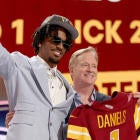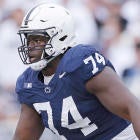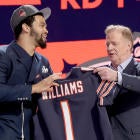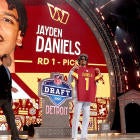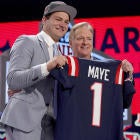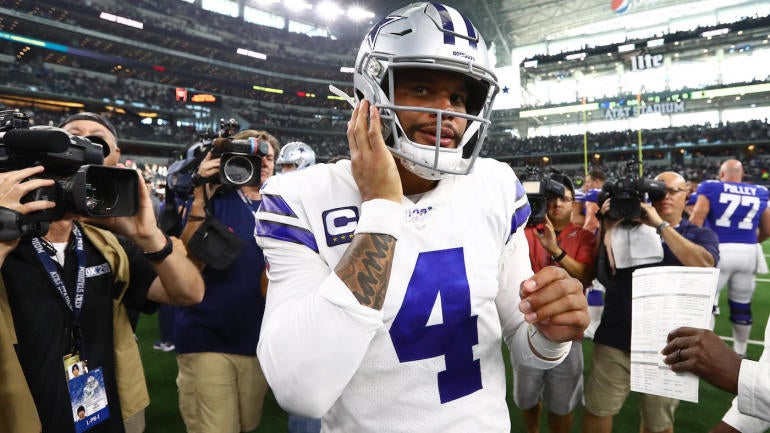
If you press your ear to this article and listen carefully, you can almost literally hear Jerry Jones and Dak Prescott exhaling. It's a hard-earned exiting of carbon dioxide from all lungs involved, considering how long it took the Dallas Cowboys to finally come to terms on a multi-year contract with their two-time Pro Bowl quarterback. The deal was literally years in the making and included several missed NFL deadlines, but when they came up against the latest one -- forced to do a deal by Tuesday, March 9 to avoid forcing him to play under a second franchise tag worth an obese $37.7 million -- both sides agreed to a historic deal with only 21 hours left on the clock.
The team will still apply the franchise tag as a matter of procedure, as part as the agreement with Prescott, however. This will help prevent the Cowboys from using a tag on him in the future, which would then be viewed as the cost-prohibitive third tag at 144 percent of the previous year's salary, and allowing him to negotiate more freely the next time around. Prescott will sign the multi-year deal before the new league year begins, which will then remove this second tag altogether.
Negotiating at its finest.
On its face, it's a four-year deal worth at least $160 million, sources confirm to CBS Sports, and it includes two separate financial league records: $126 million in guaranteed money and a $66 million signing bonus. A deeper look at the contractual details reveals a Rembrandt rather than a paint-by-numbers, however, because the deal is actually six years long with the two final years void.
As a reminder, the Cowboys were hellbent on signing Prescott for five years because they wanted to spread his cap hit over a longer period of time to make it more manageable, but Prescott's agent, Todd France, was equally as dug in on signing nothing longer than four years, so that the quarterback could re-enter free agency at a time when the NFL salary cap will allow for baseball money-type quarterback contracts (Patrick Mahomes, notwithstanding). So the question of "who won?" this negotiation yields a definitive answer when diving into the minutiae of it.
Everybody won.
This four-year deal that's technically a six-year deal has a cap spread that makes it more realistically a ... wait for it ... five-year deal (insert wink here), the latter meaning the Cowboys got exactly what they wanted. But by virtue of the final two years being void, Prescott also got exactly what he wanted. Prescott will, in fact, be available to test the open market following the 2024 season, but the final portion of his signing bonus (they're always prorated) won't land until 2025, and it'll be unnoticeable at that point -- assuming the NFL salary cap balloons as expected due to newly-signed multi-billion TV contracts and gambling revenue -- even though Prescott won't be under this contract anymore at that point.
Confused? No need to be. I brought a table with this meal.
[Note: All figures confirmed by sources with assists from Over The Cap and Spotrac]
| Year | Base Pay | Signing Bonus (Prorated) | Bonus (Roster) | Guaranteed Base | Cap Hit | Dead Money |
|---|---|---|---|---|---|---|
2021 | $9 million | $13.2 million | $0 | $9 million | $22.2 million | $95 million |
2022 | $20 million | $13.2 million | $0 | $20 million | $33.2 million | $72.8 million |
2023 | $31 million** | $13.2 million | $0 | $0 | $44.2 million | $39.6 million |
2024 | $29 million | $13.2 milllion | $5 million | $0 | $47.2 million | $26.4 million |
2025 | Void | $13.2 million | Void | Void | $13.2 million | $13.2 million |
2026 | Void | $0 | Void | Void | $0 | $0 |
Total | $89 million | $66 million | $5 million | $29 million | $160 million* |
*Max value can reach $164 million with performance escalators
**2023 salary fully guaranteed on fifth day of 2022 league year
The first thing you'll notice is how much Prescott will not hit the Cowboys cap for in 2021. Most will see the $66 million signing bonus and begin thumbing away at tweets or penning articles noting how the 27-year-old supposedly destroyed the cap in Dallas this coming season with greed when, actually, signing bonuses are always prorated; and Prescott's base pay is set at a measly $9 million in 2021. Split the signing bonus by five years at $13.2 million per, then add it back to the base salary of $9 million and the total cap hit for this year is only $22.2 million -- $15.5 million less than what the $37.7 million franchise tag would've been. And Prescott's cap hit isn't even the highest on the team this season, because that designation belongs to DeMarcus Lawrence at $25 million.
And for those wondering, if the Cowboys want to get out of the deal early for whatever reason, they'll save $4.6 million if Prescott is tabbed a pre-June 1 cut in 2023, and gain $31 million in savings if they label him a post-June 1 cut that offseason, offering the team more flexibility in that respect should things take an unexpected turn for the worse over the first two years of the new deal.
That said, yes, Prescott landed the highest signing bonus in NFL history but because he agreed to a small first-year base pay, he actually saved the Cowboys millions they'll now be able to utilize when free agency gets underway in a few days.
Additionally, and as usual, using AAS (average annual salary) to determine revenue streams is as inaccurate as it is lazy. In Prescott's contract, his AAS based upon the true four-year deal is not the same as if it's spread over five years (as you see in the table above), because arithmetic is still a thing. You've probably heard about how Prescott will earn $75 million in 2021, which is true, because he will. Look more closely and you'll see how the math works, though, because the $75 million is not a cap hit -- it's cash flow. To land at the headline-grabby $75 million figure, you take the $9 million in base pay and add it to the $66 million signing bonus, but the kicker is this (say it with me): signing bonuses are prorated.
Those bonuses are paid entirely up front in real life, but in the world of the NFL salary cap, teams are allowed to slice the damage like pie. Prescott will get the entire pie delivered to him upfront to do with as he pleases, but the Cowboys only have to eat one slice per year over the next five seasons. So all told, as far as AAS goes, while Prescott did surpass Deshaun Watson and land behind Mahomes, as CBS Sports reported in February he would, his cap hit won't break the $40 million mark until Year 3 -- two seasons before the contract voids entirely.
As far as true cash flow goes (again, this is real life cash in hand), Prescott's direct deposits will dip massively from $75 million in Year 1 to $20 million in Year 2, before bumping back to $31 million in Year 3 and ending with $34 million in Year 4. In Year 5, the Cowboys will digest the remaining $13.2 million in remaining prorated signing bonus, and eat nothing at all in Year 6 and, with the table above at your disposal, you can see how this all visibly breaks down.
Prior to signing Prescott to this deal, the Cowboys were hovering about $26 million in cap space based upon the $180 million floor -- the final 2021 cap figure still undetermined -- so subtract his $22.2 million cap hit in Year 1 and the team is looking about approximately $4 million in current space. Needless to say, they'll probably have to pull some triggers to get deeper in the green, e.g., restructure deals on players like Lawrence, Ezekiel Elliott, Amari Cooper and/or a move like releasing punter Chris Jones, but they're not nearly as against the wall as they would've been if they tagged their QB a second time.
That $37.7 million hit would've put them nearly $12 million in the red, and the Joneses would've had to begin having some uncomfortable roster conversations as they desperately sought to get in compliance before the league year begins and to allow room for maneuvering in free agency.
Those are now only one-lemonade discussions.
And assuming the NFL and NFLPA agree to a a final cap figure higher than $180 million, they'll have that much more wiggle room to begin talks with other free agents. This is all a nod to what compromise can do, considering neither side wanted to bend prior to this latest round of talks. It's also credit to the negotiating prowess of Jerry Jones, who CBS Sports was told last July didn't have a hand in negotiating with France, but instead let team exec Stephen Jones do all of the lifting. This time around, as reported in February, that was not the case, with the Hall of Famer stepping in to help close any existing gaps that took talks from "good" and "progressive" but not imminent as of Sunday evening, to a mega-deal less than 24 hours later that works for all involved.
Prescott wants to be a Cowboy for life, and he just took one major step closer to making that a reality, while also allowing the team room to continue building around him -- something they had many believe wasn't possible on a historic contract. Which again proves it's not the size of the deal, it's how you finesse it.















